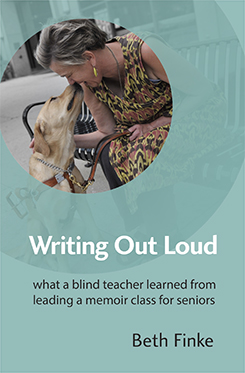I wish I’d digested the dictionary definition of “somatic” before attending a community poetry writing workshop at Access Living. The non-profit organization advocates for an inclusive Chicago that enables people with disabilities “to live fully–engaged and self–directed lives”. Part of their mission is to generate programs that give voice to creatives with disabilities. I met my writing teacher, Beth Finke and her guide dog Whitney, at the door of the poetry workshop one evening in early June.
When we entered the room, someone shouted, “Hi Beth!” and it became obvious the greeter attended one of Beth’s writing classes. I can’t go anywhere these days where I don’t run into a current or former student of Beth Finke’s. We sat on either side of a  young woman artfully made up with dark eyebrows, eyelashes and exquisite dark purple lipstick. Stephanie, her name tag read, had a white cane leaning on her chair.
young woman artfully made up with dark eyebrows, eyelashes and exquisite dark purple lipstick. Stephanie, her name tag read, had a white cane leaning on her chair.
Stephanie turned to me, asked in a low voice, “Is she the author of “Writing Out Loud”?
“Yes, she is. Have you read it?”
“I’m listening to it now.”
Our blue-jeaned leader identified himself as Matt, a poet and artist with an intellectual disability, schizophrenia. Invisible disabilities are covered under the Americans with Disabilities Act and spoken of freely at Access Living. They include conditions like chronic pain, chronic fatigue, intellectual and psychiatric disabilities and chronic dizziness. I belong.
Matt tried to describe somatic poetry, using the work of poet CAConrad. He said writing somatic poetry is a bodily experience. All his words following that beginning were Greek to me. They bunched up together, slipped and slid all over each other like a fast-forwarded recording. I mulled my exit strategy.
CAConrad invented soma(tic) poetics. It involves writing “rituals” like this: (SOMA)TIC POETRY EXERCISE (abbreviated) Wash a penny, rinse it, slip it under your tongue and walk out the door…get your pen and paper and write about POVERTY…”

Conrad describes himself as “the son of white trash asphyxiation whose childhood included selling cut flowers along the highway for his mother and helping her shoplift.” I can, more or less, relate to this life, but not to his writing.
Matt instructed us to write a “ritual” or a somatic poetry exercise, like CAConrad’s. I choked out a few deep breaths and copied the style of the CAConrad ritual. We ended by reading a few of our rituals aloud. One woman, who sat in front of the signer, described what she was hearing. Stephanie, the dark-haired beauty with the white cane, wrote about throwing her glasses out the window then frantically digging through the dirt to find them. I wrote about the best way to die.
Soma(tic) Ritual. Here & Now. Find a small bible on your shelf. Look up passages on the best way to die. Read one out loud in the elevator as you descend to the lobby. Announce to the doorman that you are a preacher now. Consecrate him and circle out. Recite passage after passage walking down the street to the birds and the bees. Ask the guy sitting on his steps to read a passage to his big black dog. Go to the park and tell the mother with her stroller you are practicing the best way to die. Read a passage to her baby. Assume the position of one who is reducing the weight of the here and now. Make your voice move words into the trees so they know the best way to die too.
Later, when I couldn’t sleep, I clicked on “somatic”: relating to the body, especially as distinct from the mind. Ahh. We came together with distinct bodies using our distinct voices—diverse souls creating our own flash community. A perfect grace note to Access Living’s mission.
The Americans with Disabilities Act (ADA) was signed into law on July 26, 1990. Special thanks to Marca Bristo, founder, president, and CEO of Access Living who worked tirelessly to draft and win passage of the ADA.
I learned the meaning of somatic while working with a therapist in 2010. I was amazed how the body expresses itself for the eyes to see, its current state of happiness or terror, while the mind is still behind on registering it. This blog reminds I need to start reading the book you recommended and free myself from pain 🙂
LikeLike
Regan, fascinating twist on fate. You might want to look into Dr. George Wald’s radio lecture series “Therefore Choose Life” in which he disparages the way humans want to preserve the Soma and gives a weighty argument that we have immortality in our Germplasm.
LikeLiked by 1 person
Can’t WAIT. This is right up my alley.
LikeLike
Love this
Sent from my iPhone
LikeLike
Ahh. Me too. Love YOU.
LikeLike